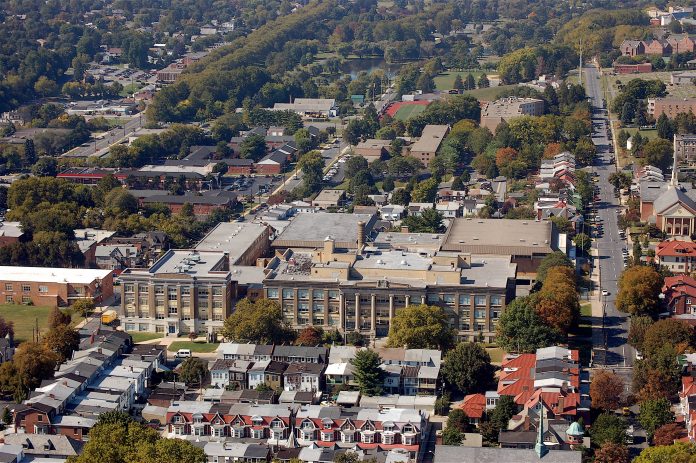On the second floor of William Allen High School, across an indoor bridge, the doors open to a computer lab. Each Thursday for the past three months, I have made this walk to the computer lab with other students from Muhlenberg College, DeSales University, and Cedar Crest College. We wait inside the lab as students peer in nervously or strut in and greet us casually. I try to find the balance between excited and casual but I never succeed, always saying “Hey!” with way too much enthusiasm. We are strangers for just a few minutes before we pair off and dive into topics strangers do not often speak of; the fear of navigating the college process as a low income student.
As the intern for the College Admissions Mentoring Program (CAMP), I work with other college students and Muhlenberg professor Michele Deegan to provide mentoring for William Allen high schoolers to navigate the college process. I did not know what to expect when I was accepted to serve as the intern. When it comes to college assistance, I have only known the absence of it; the space next to me in my senior year as I sat, wide-eyed, at my kitchen table long after dark, staring blankly at the estimated tuition of the average college. I did not think I would make it to college, but I was determined to give it a shot. I taught myself how to ll out the FAFSA form, wrote thank you notes to admissions counselors like it was my job, and tried to imagine, in my I’ll-never-get-there mindset, if I wanted a small or big school, if lack of school spirit was a deal breaker, and if the ranking of the dining hall mattered to me.
As I sat next to a William Allen senior two weeks ago and asked her these questions, my stomach tightened. “I haven’t even thought about that,” she responded. And of course she hadn’t, when something seems like a far-off dream, asking yourself the questions that make it real are difficult, because deep down, there’s a voice that reminds you just how unlikely it is. Another student sat next to me on the other side, and shared that he had already been accepted to a school. “But I can’t go,” he sighed. “It’s $60,000 a year.” When I asked him if he had finished his FAFSA application, he looked at me, confused, and asked what that was. When I explained, he pulled up the website on the computer. “Can we fill it out now?”
Low-income students, specifically those who are first-generation, are all too often branded as incompetent or unworthy because of lack of financial resources. The students I work with know what they want to do. One girl wants to pursue a degree in social work to advocate for foster kids. Another student is determined to be a representative on Capitol Hill. These students know what makes their hearts beat quicker. They know what interests them. The thing that is missing is the resources to pave the path to make those dreams come true. CAMP provides an environment for students to not be alone in the process. Sometimes, working with a student means spending the session multi-tasking between brainstorming topics for their college essay and talking to them about finding scholarships. Other times, it simply means serving as the listener as they express their worries and fears. I feel my own inner narrative change when I walk into William Allen. On Muhlenberg’s campus, my low-income status comes with me to each class. It follows me to every dinner with my friends and all the late nights at GQ. It tags along for each odd job I do. But it usually stays silent; always active, rarely shared. When I enter the doors of William Allen, a switch is turned on. I go from a world where every student is assumed wealthy unless said otherwise to a space where my need for financial aid, my anxiety about making it to college whatsoever, and my stress about ever achieving financial mobility are echoed in the lives of the students who come to CAMP. I feel their fears in my bones. I’ve been there. Everyone is asking, “What will you do after high school?” And they will only accept one answer, an answer that is coated in privilege. In an area that acts as a hub for higher education, the majority of these students have never set foot on a college campus. An hour and forty-five minutes with college students isn’t much. These students deserve a tremendous amount more. But we must do what we can to fill what would otherwise be an absence in the space next to them.























Hello, I am a Freshman, First-Generation commuter student at the ‘Berg with a “moderate to low” income. I can’t tell you how much this article means to me. I often feel so afraid that one day I will wake up and the opportunities afforded to me by Muhlenberg will be gone. This school has given so much to me, from a merit scholarship, to scientific research opportunities, to the ability to get psychological counseling for my depression and anxiety for the first time in my life. As not only the first person in my family to attend a four-year college but the first woman, I feel quite the weight on my shoulders to do everything right. Thank you so much for writing about this.